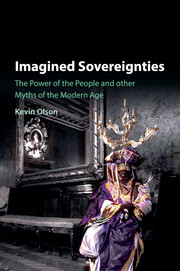Book contents
- Imagined Sovereignties
- Imagined Sovereignties
- Copyright page
- Dedication
- Contents
- Book part
- 1 Imagining Politics
- 2 “Sovereignty Is an Artificial Soul”
- 3 How Do We Write a History of Normative Practices?
- 4 The Problem of the People in Enlightenment France
- 5 Chimeras of Political Identity
- 6 Sovereign Imaginaries of the Revolutionary Caribbean
- 7 Conscripted by Modernity?
- 8 Imagining the Power of the People
- Notes
- Bibliography
- Index
- References
Bibliography
Published online by Cambridge University Press: 05 May 2016
- Imagined Sovereignties
- Imagined Sovereignties
- Copyright page
- Dedication
- Contents
- Book part
- 1 Imagining Politics
- 2 “Sovereignty Is an Artificial Soul”
- 3 How Do We Write a History of Normative Practices?
- 4 The Problem of the People in Enlightenment France
- 5 Chimeras of Political Identity
- 6 Sovereign Imaginaries of the Revolutionary Caribbean
- 7 Conscripted by Modernity?
- 8 Imagining the Power of the People
- Notes
- Bibliography
- Index
- References
- Type
- Chapter
- Information
- Imagined SovereigntiesThe Power of the People and Other Myths of the Modern Age, pp. 203 - 214Publisher: Cambridge University PressPrint publication year: 2016

